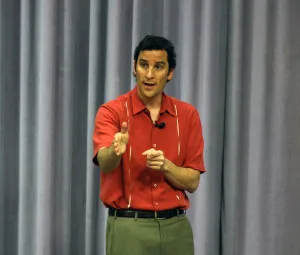Stanford Entrepreneurship Week — which extended three days past its usual weeklong time period this year — concluded Wednesday with a joint presentation by entrepreneur Sandra Kurtzig and her son Andy Kurtzig. The duo shared their experiences founding companies, and advised those in attendance to seek out work that inspires them.
As founder of ASK Corporation in 1972, Sandra Kurtzig spent much of her career selling minicomputers — precursors of modern PCs — to businesses. ASK is best known for its ManMan brand, an abbreviation for the manufacturing management software the company sold.
Despite her success with decades-old computer hardware, Kurtzig encouraged audience members to stay ahead of trends and anticipate future opportunities.

“When everything else is trying to go into a particular market…that’s probably the time to start thinking about what the next market is going to be,” she said.
Sandra Kurtzig is currently chairman and CEO of Kenandy, a company she founded in 2010 with the intent of bringing social platforms to business and manufacturing.
“We think the next market is going to be [business to business],” she said, referring to companies such as ASK and Kenandy that sell services primarily to enterprise customers.
Andy Kurtzig followed in his mother’s footsteps on the entrepreneurial track.
“He’s really been an entrepreneur, a serial entrepreneur, since he’s been a kid,” said Sandra Kurtzig, recounting a story of Andy selling balloons during a party in his childhood. “He continues to have ideas one after another all his life.”
Andy Kurtzig — currently CEO of JustAnswer, a company he founded in 2003 — then spoke about his own experiences, recalling personal stories of wanting to drop out of college to follow his entrepreneurial dreams.
“All the superstars, Steve Jobs, Bill Gates, etc. dropped out of college and were super successful,” Andy Kurtzig said. He added that his mother convinced him to graduate a year early from the University of California, Berkeley instead of dropping out.
Andy shared several stories of his ultimately unsuccessful ideas to illustrate his method of testing a market. One of his early online enterprises, a website called FileFun, tried to create a resell market for music and other files online, a concept quickly ended by Apple’s inclusion of Digital Rights Management (DRM) software in its music.
Another site he created, Darester, tried to apply the eBay online auction model to sell services instead of goods. Kurtzig started the venture with auctioning off dares in a college setting, offering the example of paying someone to shove a pie in an employer’s face.
“After two months…I realized it was not the kind of business I wanted to be in,” he said, laughing at the unexpected ways people used the service.
With persistence, however, Andy Kurtzig found major success with his current company, JustAnswer.
He attributed the company’s conceptual origins to his wife’s pregnancy, when — despite her frequent medical questions — she had less frequent access to doctors for qualified and timely medical advice. Following the experience, Andy Kurtzig decided to create a service that provides personalized and on-demand help from real doctors, lawyers and other specialists.
He emphasized the lengthy hiring and verification process, which includes everything from standardized tests to software verification.
“It’s actually harder to become a JustAnswer expert than it is to get into Stanford,” he quipped.
Andy Kurtzig stressed that, more so than simply working for money, entrepreneurs have to love what they do.
“It’s really important that you’re passionate about making a difference in the world,” he said. “I get letters all the time from customers that say, ‘You saved my daughter’s life’ and things like that. That’s what we do. We help people all day.”